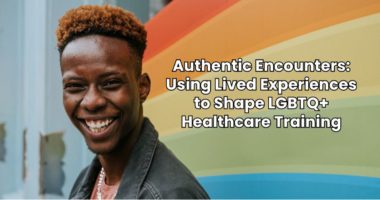 In healthcare training, “lived experience” refers to people’s firsthand accounts and personal journeys, especially while navigating their identity and health. These authentic narratives expose nuances often missed in standard medical training – “nothing about us without us.”
In healthcare training, “lived experience” refers to people’s firsthand accounts and personal journeys, especially while navigating their identity and health. These authentic narratives expose nuances often missed in standard medical training – “nothing about us without us.”
When medical professionals engage with LGBTQ+ standardized patients (SPs) who bring these lived experiences into the training environment, they unlock a deeper understanding of the community’s unique challenges and emotions, laying the foundation for more empathetic and effective care.
Authenticity of Experience
A key component of any effective simulation is authenticity. Standardized patients with LGBTQ identities provide a unique perspective, bringing a depth of understanding about the challenges and emotions tied to their identity. However, it’s crucial to recognize that while these SPs may identify as LGBTQ, it doesn’t mean they’ve personally experienced every scenario they enact. Instead, their authenticity lies in their broader understanding and personal connection to the LGBTQ community.
For instance, a transgender SP might not have personally faced distress over being misgendered, but they can draw from shared community experiences to offer an authentic portrayal of that emotion. Their portrayal isn’t about reliving their trauma but about communicating shared emotions, fears, and experiences that many within the LGBTQ community can relate to.
Such portrayals offer a real-world perspective that is essential for training. It ensures that healthcare professionals gain insights into the challenges LGBTQ patients might face, from misunderstandings to prejudices, without unnecessarily making the SPs relive traumatic events.
Enhanced Learning
There’s a profound difference between reading about experiences and interacting with someone who has lived through them. When learners engage with SPs who’ve faced the challenges, their understanding and empathy can substantially deepen.
Imagine a telehealth scenario where a young trans male seeks help for his depressive symptoms. The SP can authentically portray the patient’s emotional state, highlighting not just the medical aspect of his depression, but also the social and interpersonal factors affecting his well-being.
In this psychologically safe and collaborative training environment, learners can practice cultural humility — the ability to remain open to another person’s identity. They’re encouraged to try new approaches and make mistakes, leveraging the invaluable benefits of experiential learning to become more effective and empathetic healthcare providers.
Immediate Feedback
Practice is invaluable, but it’s feedback that truly shapes and refines a healthcare provider’s approach. When SPs are representative of the communities they portray, their insights offer rich, grounded, and actionable guidance.
After a simulated session, an SP provides substantive feedback focused on the interpersonal skills exhibited in the encounter by linking specific observable behaviors to their personal feelings. For example, an SP might remind a learner of their choice to verbally emphasize that this is a “safe and supportive space to receive affirming care” and share that it made them feel reassured and calm in this learner’s presence. They may also contribute that when the learner asked, “what are your ‘preferred pronouns’”, that it made them feel judged, because their pronouns are not a choice or a preference. The SP would then guide the learner through recommendations on how else to handle that situation and invite the learner to re-practice that moment.
In conclusion, SPs with lived experiences are more than just role players; they bridge theoretical knowledge and authentic understanding. By integrating these SPs into LGBTQ healthcare training, we can ensure that healthcare professionals are informed, deeply empathetic, and equipped to provide the best possible care to the LGBTQ community. Embracing this approach is a significant step towards a more inclusive, compassionate, and efficient healthcare system.
Elevate your LGBTQ+ healthcare training with authentic interaction! Dive deep into the lives of the LGBTQ community with Simclusive’s innovative simulation training. Engage with simulated patients who bring genuine lived experiences to the table. From nuanced interactions to actionable feedback, our simulations offer an unparalleled opportunity to truly understand and connect with the LGBTQ community. Click here to learn more about our service.

